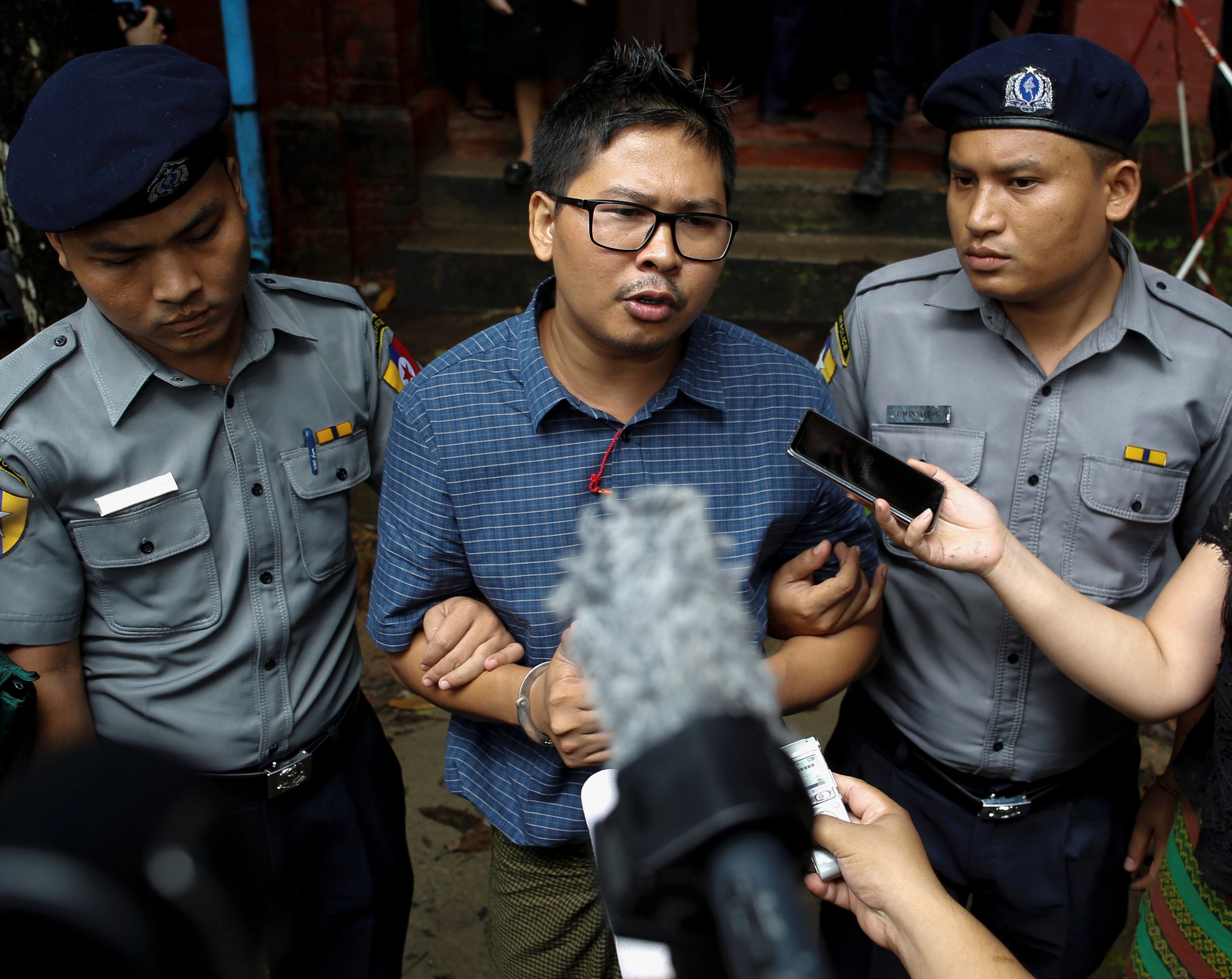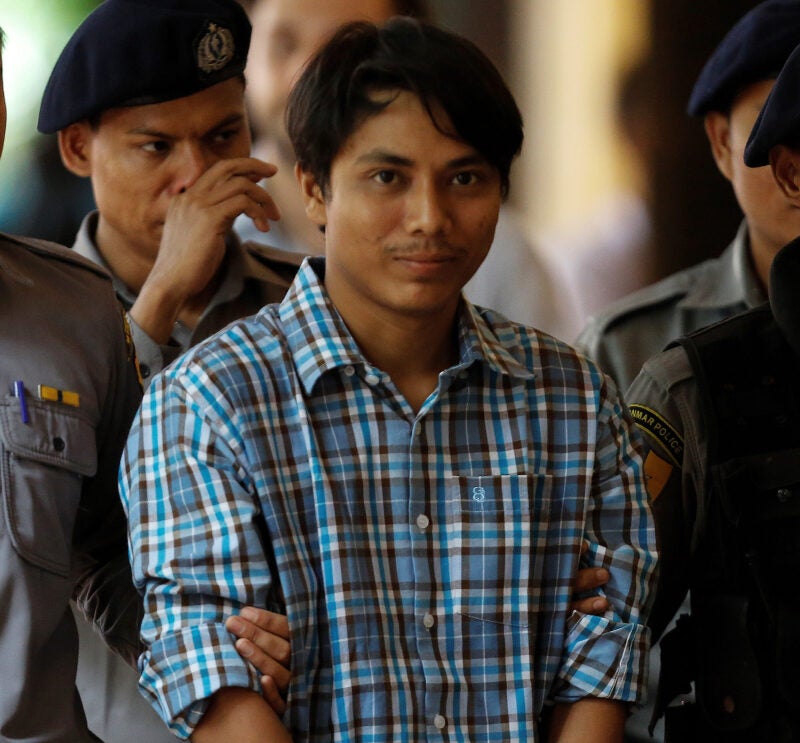
One of two Reuters journalists detained in Myanmar for eight months said he rejected an offer to negotiate their arrest in return for not publishing a story about the murder of ten Muslim men, the news agency has reported.
Wa Lone and Kyaw Soe Oo were arrested on 12 December last year after being accused of obtaining secret state documents during the course of their investigation into the massacre in Rakhine state, Myanmar.
Both men pleaded not guilty but face 14 years in prison if convicted of breaching the country’s Official Secrets Act. Closing arguments will be heard in a fortnight before the judge declares his verdict.
Reuters has provided updates throughout the court proceedings and its homepage continues to display a graphic showing how many days its reporters have held in pre-trial detention – currently at 240.
According to the agency’s reporting of the defence case, which began on 16 July and concluded on Monday, Lone told the court that during his interrogation he rejected an offer from an officer for a “negotiation” over his and Soe Oo’s arrests if they agreed not to publish the massacre story.
He also said interrogating officers had criticised their reporting, asking why the men were writing about the Rohingya people.
“They said: ‘You are both Buddhists. Why are you writing about ‘kalars’ at a time like this? They aren’t citizens’,” Lone (pictured) told the court. “Karlar” is a derogatory term for a Muslim in Burmese.
Both of the reporters told the court their interrogations had focused on the story they had been working on, rather than they documents they were accused of obtaining.
Lone said: “During the whole interrogation, they didn’t ask with interest about the secret documents found on us, but they probed our reporting of Maungdaw, Rakhine.”
Soe Oo said the police reacted angrily, asking: “Why haven’t you told us about this?”, when, during his interrogation, they found photos on his phone of the ten Rohingya men taken shortly before they were killed.
Soe Oo (pictured below) said he was asked whether he had “sent the photos from my phone to human rights organisations from foreign countries”. He said he had not, adding: “I’m a reporter and I follow journalistic ethics.”

Detained Reuters journalist Kyaw Soe Oo arrives at Insein court in Yangon, Myanmar August 6, 2018. Picture: Reuters/Ann Wang
The men also described the treatment they faced during two weeks of questioning after their arrests.
Soe Oo told the court their heads were covered with black hoods as they were taken from a police station to an interrogation site, and that he was then asked questions for three days straight while wearing handcuffs.
Lone said: “I hadn’t slept for many hours but they kept interrogating me. I was exhausted.”
The officer in charge of the police station, Captain Myint Lwin, previously denied that the reporters were deprived of sleep or made to kneel for hours.
The men also denied the prosecution’s case that they were found with the secret documents at a routine traffic stop.
They maintained that they were asked by a police officer to meet at a restaurant after office hours to discuss their story and that, once they were there, they were handed the documents unprompted.
Lone said: “The documents found in my hands were given by Police Lance Corporal Naing Lin to set us up and arrest us.”
Naing Lin previously told the court he had met the reporters on 12 December but did not hand them anything, and that it was Lone who had initiated the meeting.
The reporters said they were arrested and handcuffed by a group of men in civilian clothing immediately after leaving the restaurant, before they had even looked at the documents they were given.
Lone claimed that as they were driven to a police station after their arrest, he heard one of the men call a police lieutenant colonel and tell him: “We’ve got them, sir.”
Lone continued to maintain his innocence throughout his testimony, telling the court: “I am a young person who has always tried to contribute to the development of the country. I’ve only ever worked for media organisations, and have never worked in other types of organisations. I am not a spy.”
Before he was taken back to jail on Monday he told reporters: “The day of decision will arrive soon. We believe that it will proceed in a fair and just way.”
On Monday Ye Naing Moe, director of Yangon Journalism School, vouched for the integrity of his former students in the witness box.
“We haven’t seen any stories they wrote which have violated media ethics,” he said. “I believe that Wa Lone and Kyaw Soe Oo performed the most important role of journalists, which is telling the truth.”
On Saturday, US Secretary of State Mike Pompeo raised concerns about the reporters to Myanmar’s Foreign Minister Kyaw Tin, saying they had been detained “for doing their job”.
“They should be released immediately,” he tweeted.
In response, Myanmar government spokesman Zaw Htay told Reuters: “According to the constitution, our judiciary is independent so we must wait and see what the court decides.
“Reuters and the families of the reporters are being treated equally under the law, with all the procedures being respected. For example, they can hire the lawyers they want.”
Pictures: Reuters/Ann Wang
Email pged@pressgazette.co.uk to point out mistakes, provide story tips or send in a letter for publication on our "Letters Page" blog
